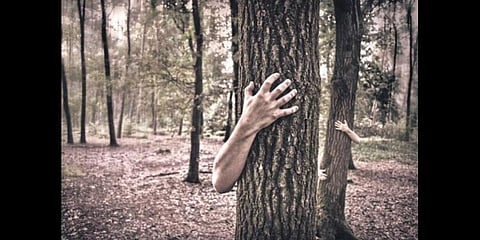

Are the women of Assam still regarded as Circes? If Moushumi Kandali is to be believed, in north Indian metros such as Delhi and its environs, where many of these short stories are set, the depraved and lustful men (“hyenas”) of those regions still think they are. While it is true that the Shakti Peeth of Kamakhya in the Nilachal hills of Guwahati is one of the oldest and most venerated centres of tantric practice, and the women of the region were once reputed to be sorceresses (as in the first story of this collection), by late 19th century, uxorious husbands were jokingly referred to as the sheep men of Kamakhya, and were depicted as such in the famous Calcutta woodcuts. Are culturally delinked Indians of today even aware of the existence of such myths? However, it can’t be forgotten that in certain parts of India, northeastern women are eyed in an objectionable way.
Although Kandali’s Delhi short stories are mostly based on this anachronistic premise, it must be admitted that the author (the credit also goes to Parbina Rashid) has a way with words, with her prose often approaching the poetic. But then again we are reading her in translation, and without any knowledge of Assamese in which these stories were originally written. How can we be absolutely sure of the fidelity of the translator to the original text?
I raise this issue because of the breach between Kandali’s fiction and reality. If one can set aside Kandali’s repeated references to rape and stomach-churning violence against women in megacities (the Nirbhaya case in particular), one is all admiration for her evocation of the physical texture and smells of a big, bad city and its rapid transit system in twilight in ‘The Hyenas and Coach Number One’ about the vulnerability of young “radiantly fair” migrant women from Assam who move outside their state for work or higher studies.
“Yes! Every evening as she got down at the metro station on her way back from work, she remembered a scene from a documentary she had seen on Animal Planet some time back... Long, measured, hesitant steps, ears trying to trace some impending terror, ready to bolt if necessary....” Kandali is equally good at conjuring up the firefly-studded evenings and mysterious nights in Assam villages and the unspoiled beauty of nature. And here’s a British officer eating paan for the first time way back in 1835: “It overpowered him, he felt as if a drum was beating wildly inside his chest, capsizing his heart.”
These are not straightforward stories, but we enter the protagonist’s mind and witness the narrative unfold through his or her eyes. In the account of the steadfast friendship between an Assamese lad and a boy from the hills of Nagaland, societal hostility notwithstanding––Kandali describes with great restraint and sensitivity without downplaying the horror of it––how the latter was almost lynched because of his “slanting eyes, this spiky hair and this yellow hair”.
Her most memorable stories are about the predicament of the people of the turbulent state of Assam. In ‘The Final Leap of the Salmon’, Kandali spins a magical web of words as she recounts the struggle of the young commandos of ULFA––“...the one who survived the bullets of the Burmese and the Indian Army....” Her most disturbing yet skillfully crafted ‘Shark, Shark, a huge Shark’ is about the Assam agitation of the 1980s as reflected in the shadowy world of a man whose mind is in tatters. It is not a linear narrative and till the last section it is challenging to predict the denouement. Yet a reader may find it difficult to accept Assamese people as Hanuman worshippers, and the image of a girl getting stripped going viral in Mahabharata times. These flaws under- mine our appreciation of Kandali’s considerable talent as a wordsmith.
The Black Magic Women
By Moushumi Kandali
Translated by Parbina Rashid
Publisher: Vintage
Pages: 177
Price: Rs 299